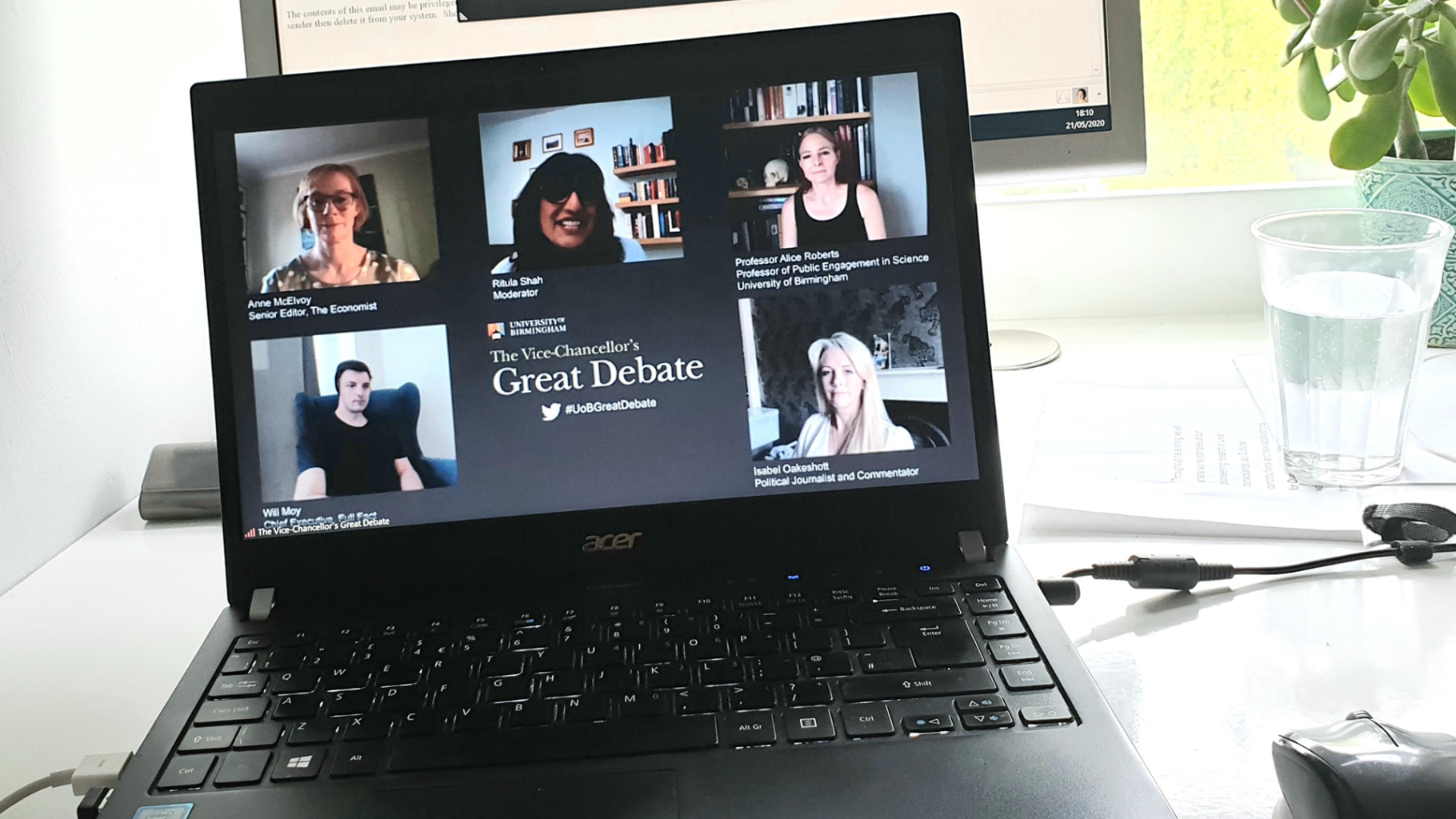 At the start of lockdown our team, like many others, looked at what plans we had and made some quick and often obvious decisions about which engagements we could continue online in some way, and which may need to be paused.
At the start of lockdown our team, like many others, looked at what plans we had and made some quick and often obvious decisions about which engagements we could continue online in some way, and which may need to be paused.
One of those engagements was the annual Vice-Chancellor’s Great Debate, due to take place in May on campus. The topic for debate was ‘What are the challenges we face in trusting social media?’ and the timing seemed particularly apt as many people were increasingly relying on social media to connect with others during lockdown. To not go ahead with the debate seemed like a missed opportunity.
And we also had a full line-up who were ready to go. In the months before lockdown we had worked hard to secure a great series of panellists with a diverse range of viewpoints: Anne McElvoy, Senior Editor of The Economist; Will Moy, Chief Executive of Full Fact; Isabel Oakeshott, political journalist and commentator; and Alice Roberts, Professor of Public Engagement in Science at the University of Birmingham. We were particularly pleased that BBC Radio 4 journalist, Ritula Shah, had also agreed to return to chair the Great Debate, as she had masterfully done so for us in 2018 and 2019.
Challenges
There were two main challenges in moving to an online format: The Vice-Chancellor’s Great Debate already had an established, polished format similar to BBC’s Question Time, which our audience and stakeholders had come to expect. The second challenge was that this involved not just one external guest speaker (like many of our other events such as the Baggs’ Memorial Happiness lecture), but five. Using a simple Zoom solution was not going to work, particularly when we wanted the panel to be able to debate and interject, rather than speak in turn.
Hosting an online event was also new territory to the team so we brought in specialist external expertise who listened to how we wanted the event to look and feel. They worked closely with us in producing the event on specialist production software allowing it to be recorded in HD.
We weighed up the pros and cons of whether to hold it live or to pre-record the debate. In the end, we opted to pre-record it ‘as live’ mainly because of the number of panellists involved. One of the main risks was the possibility of someone’s internet connection momentarily dropping out (we’ve all had one of those moments during lockdown, haven’t we?). Pre-recording it meant we could pause and resume the debate when everyone was back online, rather than keep our audience hanging around waiting for technical gremlins to be resolved. We retained the use of a ‘green room’ to virtually welcome our guest speakers and give them a final briefing on proceedings – and used the now ubiquitous Zoom for this purpose.
To retain an element of audience participation we asked the public to submit questions in advance and used the hashtag #UoBGreatDebate during the YouTube première.
The final product
We are really pleased with the final product which was produced from the team’s respective spare rooms and kitchen tables … a somewhat different experience from hosting it in the glorious Elgar Concert Hall. The entertaining and insightful debate also helped us to continue to engage with our University community – our staff, students and local community – during lockdown, as well as opening up the event to new audiences much further afield. We were thrilled that it attracted 9,000 views on the University’s YouTube and Facebook channels when it premièred, and within a week it had had over 20,000 views.
We were also able to tie our own academic expertise to it with Dr Victoria Goodyear commenting on what was said about how young people engage with social media, and the research she is doing to better understand this.
Our experience with experimenting with this new way of holding events has been incredibly positive. It has helped develop our understanding and knowledge of how to go about doing this, indeed we are now in the process of looking at what we take online next… watch this space.
You can watch the Vice-Chancellor’s Great Debate, ‘Trolls, flat-earthers and fake news purveyors: What are the challenges we face in trusting social media? on the University of Birmingham’s YouTube channel.
